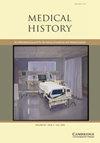Sex work, containment and the new discourse of public health in French colonial Levant
IF 1.1
2区 哲学
Q4 HEALTH CARE SCIENCES & SERVICES
引用次数: 0
Abstract
Abstract This article addresses how French academics, doctors and state bureaucrats formulated sex work as a pathology, an area of inquiry that had to be studied in the interest of public safety. French colonisation in the Levant extended the reach of this ‘expertise’ from the metropole to Lebanon under the guise of public health. Knowledge produced by academics was used to buttress colonial state policy, which demanded that sex workers be contained to protect society against medical contagion. No longer drawing conclusions based on speculation, the medical establishment asserted its authority by harnessing modern advances in science and uniting them with extensive observation. ‘Empirical facts’ replaced ‘opinions’, as doctors forged new approaches to studying and containing venereal disease. They accomplished this through the use of statistics and new methods of diagnosing and treating maladies. Their novel approach was used to treat sex workers and to support commercial sex work policy both at home and abroad. Sex workers became the objects of scientific study and were consequently problematised by the state in medicalised terms.法国殖民黎凡特的性工作、遏制和公共卫生新话语
本文阐述了法国学者、医生和政府官员如何将性工作表述为一种病理学,这是一个为了公共安全而必须研究的探究领域。法国在黎凡特的殖民统治以公共卫生为幌子,将这种“专业知识”的范围从大都市扩展到黎巴嫩。学术界产生的知识被用来支持殖民国家政策,这些政策要求遏制性工作者,以保护社会免受医疗传染。医学机构不再根据推测得出结论,而是通过利用现代科学进步并将其与广泛的观察结合起来,来维护其权威。“经验事实”取代了“观点”,医生们形成了研究和控制性病的新方法。他们通过使用统计数据和诊断和治疗疾病的新方法来实现这一目标。他们的新方法被用来治疗性工作者,并支持国内外的商业性工作政策。性工作者成为科学研究的对象,并因此被国家以医学术语提出问题。
本文章由计算机程序翻译,如有差异,请以英文原文为准。
求助全文
约1分钟内获得全文
求助全文
来源期刊

Medical History
医学-科学史与科学哲学
CiteScore
1.60
自引率
0.00%
发文量
25
审稿时长
>12 weeks
期刊介绍:
Medical History is a refereed journal devoted to all aspects of the history of medicine and health, with the goal of broadening and deepening the understanding of the field, in the widest sense, by historical studies of the highest quality. It is also the journal of the European Association for the History of Medicine and Health. The membership of the Editorial Board, which includes senior members of the EAHMH, reflects the commitment to the finest international standards in refereeing of submitted papers and the reviewing of books. The journal publishes in English, but welcomes submissions from scholars for whom English is not a first language; language and copy-editing assistance will be provided wherever possible.
 求助内容:
求助内容: 应助结果提醒方式:
应助结果提醒方式:


